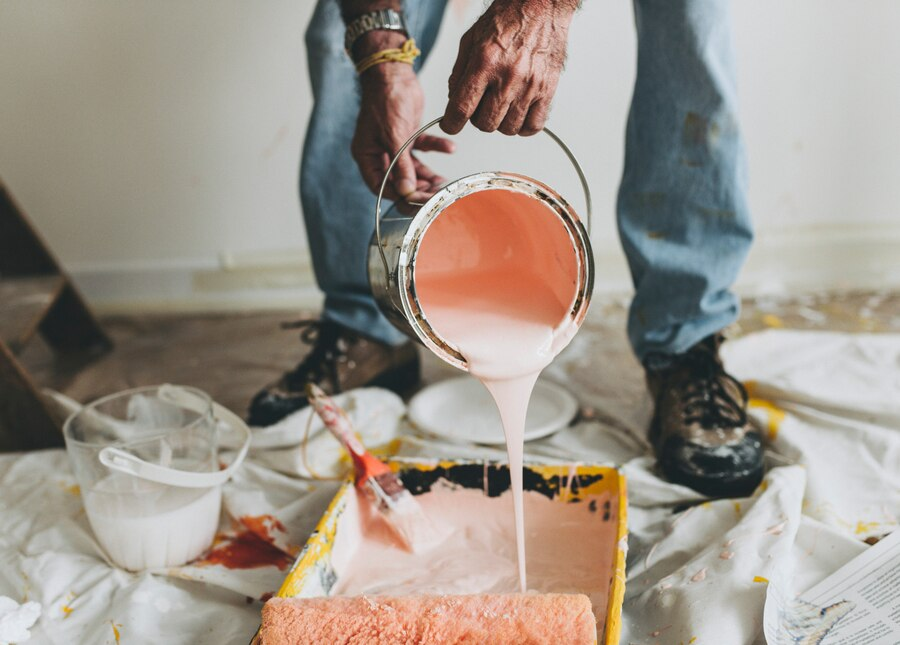Need Window Cleaning, Power Washing & Gutter Cleaning?
We do that too! Check out J&S Clean Pros:
Navigating Residential and Commercial Painting Projects
Painting is one of the best ways to give a space a fresh, appealing appearance that every property owner desires. However, not every painting project is made equal. Residential and commercial painting projects are two different categories. While both have the power to improve and change spaces, it’s important to know the key differences between them. Most individuals don’t know the distinctions between painting residential and commercial spaces until they are required to choose the best contractor for the work.
What is Residential and Commercial Painting
Residential and commercial painting projects are two distinct painting services. That’s why it’s important to choose the right painting contractor to meet the specific needs of different types of properties and clients.
Residential Painting Project
Residential painters offer painting services for both the inside and the outside of the house that has been prepped and painted. Compared to commercial operations, home paint jobs require fewer painters and less time. Additionally, residential painters can paint trim, decks, and cabinetry in homes.
- Residential painting involves painting the interiors and exteriors of houses, apartments, condominiums, and other types of residential properties.
- The goal of residential painting is to enhance the appearance of the home, protect surfaces from damage, and increase property value.
- Services typically include painting walls, ceilings, doors, windows, trims, decks, fences, and other surfaces within a home.
Commercial Painting Projects
Commercial painting involves applying a new layer of paint to office buildings, residences, factories, educational institutions, and medical facilities. Contractors specialize in a range of project sizes. To complete larger projects by the deadline, additional personnel, sophisticated equipment, and possibly alternative work schedules are needed.
- Commercial painting involves painting non-residential properties such as offices, retail stores, restaurants, hotels, hospitals, schools, and industrial buildings.
- The objectives of commercial painting go beyond aesthetics; it includes maintaining a professional appearance, protecting surfaces from wear and tear, and adhering to safety and regulatory standards.
- Services may include painting interior and exterior walls, ceilings, floors, metal structures, parking lots, and specialized coatings for areas like kitchens, bathrooms, or high-traffic zones.
9 Differences Between Residential and Commercial Projects
While both residential and commercial painting involve similar skills and techniques, such as surface preparation, priming, and applying paint, they differ in scale, scope, and specific requirements dictated by the type of property being painted.
Scale and Scope
Residential painting projects tend to be smaller in scale compared to commercial projects. Residential projects usually involve painting individual homes or small apartment complexes, whereas commercial projects may include large office buildings, shopping malls, or industrial facilities.
Surface Materials
Residential properties often have a variety of surface materials, such as drywall, wood, stucco, and siding. Commercial properties may have more diverse surfaces, including concrete, metal, glass, and specialized coatings.
Regulatory Compliance
Commercial painting projects often need to comply with specific regulations and standards related to safety, environmental impact, and accessibility, which may not be as stringent for residential projects.
Timeline and Scheduling
Commercial painting projects typically have tighter deadlines and require careful coordination to minimize disruptions to business operations. Residential projects may have more flexible timelines, allowing for work to be completed at the homeowner's convenience.
Client Communication
In residential projects, communication is often direct between the homeowner and the painting contractor, allowing for personalized attention to the homeowner's preferences. Commercial projects may involve multiple stakeholders, such as property managers, architects, or facility managers, necessitating clear and frequent communication among all parties involved.
Equipment and Tools
Commercial painting projects may require specialized equipment and tools to handle larger surfaces and heights, such as scaffolding, aerial lifts, or industrial sprayers. Residential projects typically involve more conventional equipment suitable for smaller-scale work.
Color and Design Considerations
Residential painting projects often prioritize aesthetic preferences and personal style, with homeowners having more freedom to choose colors and design elements. Commercial projects may require adherence to corporate branding guidelines or architectural specifications, limiting design flexibility.
Surface Preparation
Due to the higher traffic and usage levels in commercial properties, surface preparation in commercial painting projects may involve more extensive repairs, cleaning, and priming compared to residential projects.
Durability and Longevity
Commercial painting projects often require more durable and long-lasting coatings to withstand heavy foot traffic, exposure to harsh environmental conditions, and frequent maintenance. In some cases, residential projects may prioritize aesthetic appeal over long-term durability.
FAQs
Do I need to move my furniture before the painting crew arrives?
While professional painters can move furniture as part of their service, it's often preferred that homeowners move small items and valuables themselves before the crew arrives to ensure their safety and facilitate the painting process.
Can you help me choose the right paint color for my home?
Many painting contractors offer color consultation services to help homeowners choose the perfect paint colors for their homes. They can provide samples, suggest color schemes, and offer advice based on the homeowner's preferences and the property's style.
How will the painting project affect my business operations?
Professional commercial painters strive to minimize disruptions to business operations during painting projects. They often work during off-hours, weekends, or holidays to ensure minimal interference with daily activities. Clear communication and proper planning are key to minimizing disruptions.
What type of paint is best suited for our commercial property?
The best type of paint for a commercial property depends on factors such as the surface material, environmental conditions, traffic levels, and desired durability. Professional painters can recommend suitable paints and coatings tailored to the specific needs of the property.
Conclusion
If you need a skilled and reputable painting contractor, J&S Paint Pros is prepared to change any space, whether it’s a small painting job for your home or a major painting project for your business. We are equipped with the experience, equipment, and expertise that homeowners and business owners have been able to rely on for more than 30 years. To start your paint job,
contact us today.












